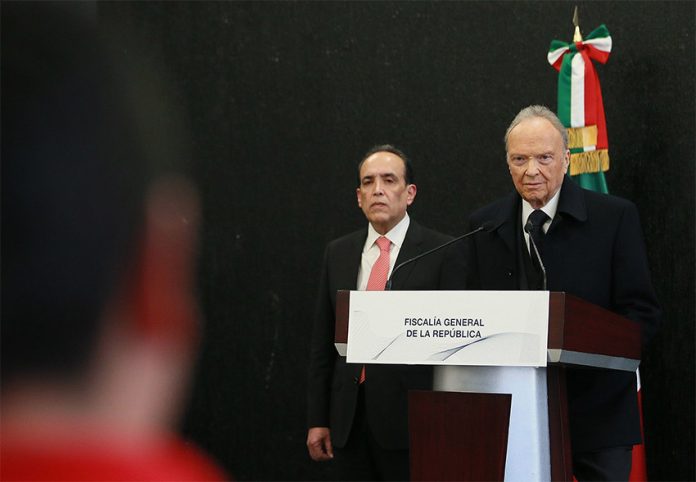Who piloted the plane that transported alleged Sinaloa Cartel leaders Ismael “El Mayo” Zambada García and Joaquín Guzmán López to an airport near El Paso, Texas, and into the hands of United States law enforcement authorities on July 25? And was that alleged kidnapping an act of treason against Mexico?
Where was former Culiacán mayor Héctor Melesio Cuén Ojeda murdered the same day?
They are among the questions the Federal Attorney General’s Office (FGR) is seeking to answer as it investigates the events that occurred both before and after Zambada and Guzmán boarded a plane that landed at the Doña Ana County International Jetport in New Mexico just over three weeks ago.
The FGR said in a statement on Thursday that the main focus of its investigation into the Zambada-Guzmán case was to establish whether treason was committed given that kidnapping a person in Mexico for the purpose of handing him or her over to the authorities of another country constitutes that crime.
Zambada, via a statement issued by his lawyer, claimed he was kidnapped and forced onto a U.S.-bound private plane after traveling to Culiacán with the belief that he was going to help resolve a dispute between Sinaloa Governor Rubén Rocha Moya and Cuén.
With regard to the murder of Cuén, the FGR raised doubts about the Sinaloa Attorney General’s Office’s finding that the former mayor was shot and killed at a gas station in Culiacán.
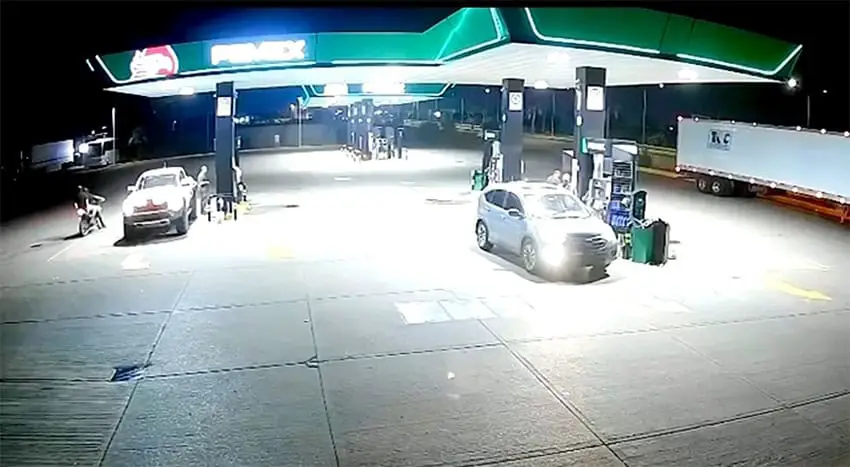
Was the alleged kidnapping of El Mayo treason?
The FGR said that the “fundamental evidence” needed to determine whether the crime of treason was in fact committed is in the United States and “directly linked to an illegal flight” to the U.S.
It said that the registration of the plane — a Beechcraft King Air — was “cloned,” or fake, and that the conduct of the person who piloted the aircraft was “completely irregular.”
The pilot “hid all the information about his flight in Mexican territory until arriving at the border, where he only gave notice of his approach and landing in United States territory, where they were waiting for him,” the FGR said.
The agency said it carried out investigative tasks at the Doña Ana airport with the authorization of the U.S. government, but didn’t obtain the evidence needed to determine whether treason was committed in the alleged kidnapping of El Mayo.
In that context, the international affairs division of the FGR and Interpol México asked the United States Department of Justice for a range of information that “until today has not been provided,” the FGR said.
Among the information they requested was the document showing the prior authorization of U.S. Customs and Border Protection for the flight carrying Zambada and Guzmán López to enter the United States.
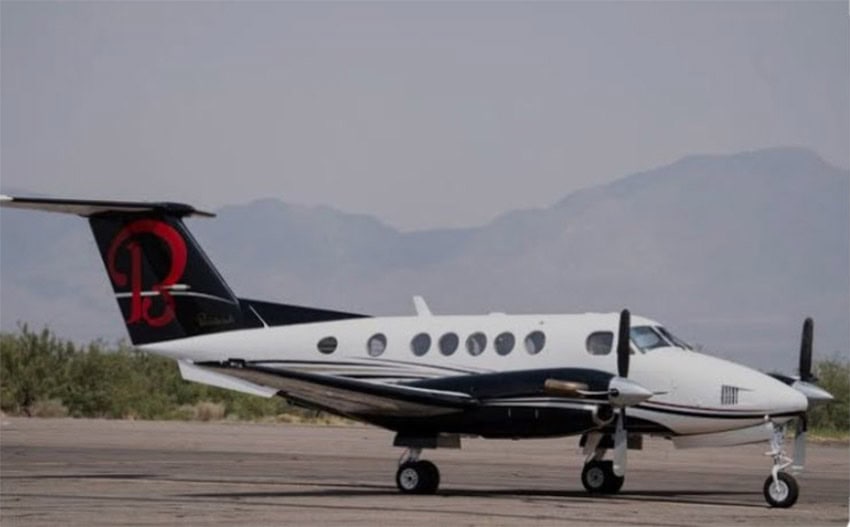
They also asked for immigration and customs records, details regarding the identity of the pilot and a range of information about the plane, among other documents.
The FGR also said that Mexico’s Criminal Investigation Agency (AIC) has determined the location of the airstrip near Culiacán where the “clandestine” flight took off.
The murder of Cuén
The FGR said it obtained a copy of a Sinaloa Attorney General’s Office (FGE) file on the investigation into the homicide of Cuén, mayor of Culiacán between 2011 and 2012, founder of the regionally influential Sinaloa Party and rector of the Autonomous University of Sinaloa (UAS) between 2005 and 2009.
In his statement, Zambada said that Guzmán López asked him to attend a meeting near Culiacán on July 25 to help resolve a dispute between Governor Rocha and Cuén over who should head up the UAS.
El Mayo also asserted that Cuén was not shot at a gas station, as the FGE said. Rather, he claimed that Cuén was killed at the same property outside Culiacán where Zambada was kidnapped.
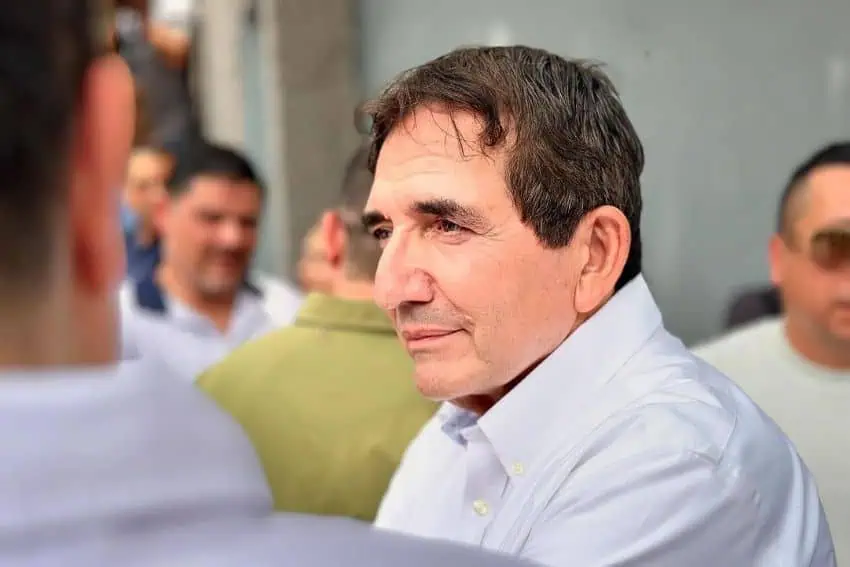
To support its version of events, the Sinaloa FGE released a video earlier this week that purportedly shows Cuén being shot while inside a white pick-up truck at a gas station in La Presita, on the outskirts of the city of Culiacán. In the footage, a man gets off a motorbike beside the vehicle, opens the passenger side door, fires his weapon, gets back on the motorbike and flees along with an accomplice. The pick-up truck subsequently departs. Flashing police lights are visible as the motorbike flees the scene along a road that passes in front of the gas station.
Neither the person who was apparently shot — allegedly Cuén — or the driver of the pick-up truck are visible in the footage.
The FGE said in a statement last Saturday that one of its “main lines of investigation” was that Cuén’s murder occurred during an attempted vehicle robbery, although the footage doesn’t suggest that was the case. It noted that the “main witness” — the driver of the white pick-up, Fausto Corrales Rodríguez — told authorities that the murder occurred during an attempted vehicle robbery.
In its statement, the federal-level FGR — which has taken over the investigation from Sinaloa authorities — said that experts and analysts from the AIC examined the FGE file and found that Cuén’s body had a “severe hematoma” on the head as well as four gunshot wounds on his legs.
However, in the gas station video “only one shot is heard,” the FGR statement said.
The statement also said that three gas station employees did not report hearing gunshots (note the use of the plural). In addition, the FGR noted that the identity of the occupants of the pick-up truck is impossible to distinguish in the video.
The FGR said that neither the scene of the apparent shooting nor the pick-up truck was forensically examined.
The agency also asserted that the autopsy on Cuén’s body was not carried out “correctly.” State officials subsequently cremated the body in violation of “criminalistic practices” governing homicide investigations.
Initial reports said that Cuén was shot while driving near La Presita, north of downtown Culiacán, and died 30 minutes later in a private clinic due to a heart attack caused by loss of blood.
AMLO calls for thorough investigation into murder
At his morning press conference on Friday, President Andrés Manuel López Obrador acknowledged the discrepancies between the Sinaloa FGE investigation and the findings of the FGR.
The FGR in its statement announced that “there are things that aren’t in agreement,” he said.
“We want a through, serious investigation to be carried out,” López Obrador said, adding that the FGR should disclose all its findings “with complete freedom.”
Asked whether he maintained confidence in Governor Rocha, a representative of Mexico’s ruling Morena party, the president said he did.
Rocha, who took office in 2021, appointed the Sinaloa Attorney General, Sara Bruna Quiñónez Estrada, who resigned on Friday after discrepancies between the state and federal findings came to light.
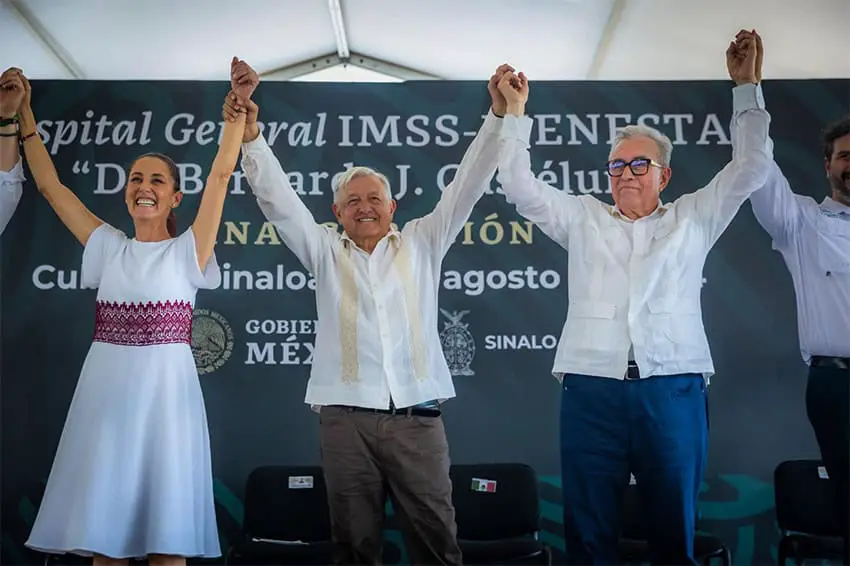
López Obrador said he continued to support the Sinaloa governor “because we don’t know if he was aware of this situation.”
“He has already said he wasn’t in the country” on July 25, he said, referring to Rocha’s statement that he was in Los Angeles on the day Zambada and Guzmán López arrived in the United States and Cuén was killed.
US prosecutors request Zambada’s transfer to NY
United States prosecutors asked a court in El Paso, Texas, on Thursday to hold a hearing to being the process to transfer Zambada to New York, where he would face trial in the same Brooklyn courthouse where his Sinaloa Cartel co-founder Joaquín “El Chapo” Guzmán was convicted on drug trafficking charges in 2019.
U.S. District Judge Kathleen Cardone agreed to the request.
If prosecutors get their wish to have Zambada transferred, the case against him in Texas will proceed after his prosecution in New York, the Associated Press reported.
Zambada, 76, faces a range of charges including drug trafficking, money laundering, firearms offenses, kidnapping and conspiracy to commit murder. He pleaded not guilty to all charges the day after his arrest.
Guzmán López, one of El Chapo’s sons and reportedly a Sinaloa Cartel financial operator, also faces drug trafficking charges. He is in custody in Chicago, where he pleaded not guilty on July 30.
Mexico News Daily
